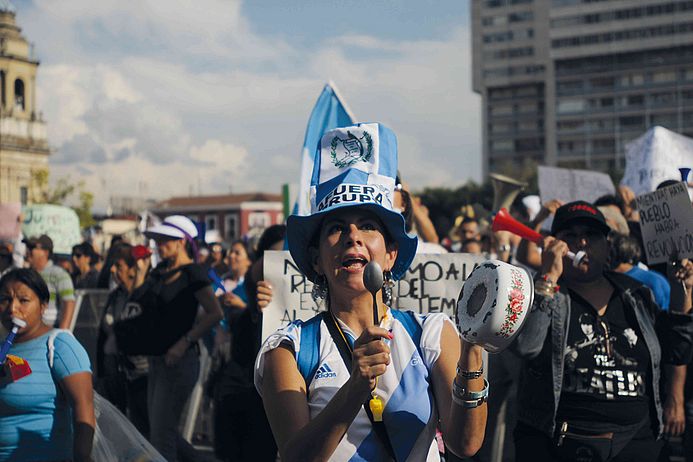‘They’ve taken everything from us, even our fear.’ This was just one of many slogans in the sea of signs at the great day of protest on 25 April 2015 that marked the start of a massive upheaval by Guatemalan civil society. In the following months, this diversified movement achieved major successes. After Vice-president Roxana Baldetti was forced from her post, President Otto Pérez Molina complied with the people’s central demand and resigned at the start of September.
The protests were a reaction to the disclosures of the public prosecutor’s office and the CICIG international commission against immunity about the La Linea criminal network that controlled the customs and tax authorities, and stands accused of massive corruption. What could not be foreseen was the emergence of such a broad and lasting movement. In earlier decades, Guatemala was known for its apathy, with a population paralysed by fear, and elites abusing their power unrestrained. The situation and the impunity for crimes against the Guatemalan population during the civil war seemed impossible to change.
In recent years, however, the struggle by human rights activists and social movements in cooperation with an engaged public prosecutor’s office to uncover human rights violations has repeatedly won partial victories. One high point was the conviction of former dictator Rios Montt in 2013. Maria Sanchez, psychologist at the medico partner organisation ECAP, says that the trial sparked a broad and highly controversial debate. ‘Since then, people have talked about issues and said things which were previously unthinkable. Young people are asking their parents and grandparents about the civil war.’
However, the protest movement has not succeeded with all its demands. New elections were not postponed until a new electoral and party legislation is in force, the calls for a transitional government of national unity and a constitutional assembly from the grassroots have been ignored. One thing is, indeed, certain – the paralysis in Guatemala caused by fear and apathy is a thing of the past.
Moritz Krawinkel
A decades-long (civil) war under the military dictatorship against its own population not only cost innumerable lives in Guatemala – it also cemented the disadvantages suffered by many rural and indigenous communities. For decades medico has been successfully supporting the political, psychosocial and legal struggle against immunity, particularly the psychosocial work of ECAP and the ‘Bufete de Derechos Humanos’ (Office of Human Rights Attorneys)“. Medico is also supporting the work of the partners ‘Asociación Coordinadora Comunitaria de Servicios para la Salud’ (ACCSS) and ‘Sagrada Tierra’ in the field of local community development and health services in rural regions.

